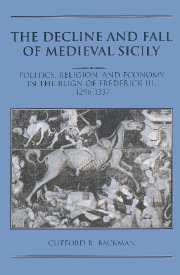 The Decline and Fall of Medieval Sicily
The Decline and Fall of Medieval Sicily Book contents
- Frontmatter
- Contents
- Preface
- Note on currency and measures
- List of abbreviations
- Map: Sicily in the early fourteenth century
- 1 The kingdom at risk
- 2 The international scene: war without and within
- 3 A divided society I: the urban–demesnal world
- 4 A divided society II: the rural–baronial world
- 5 The religious scene: piety and its problems
- 6 In the margins: slaves, pirates, and women
- Conclusion
- Table 1 Judices of Palermo
- Table 2 Juriste and xurterii of Palermo
- Table 3 Judices of Agrigento, Catania, Messina, Polizzi
- Table 4 Feudal dues
- Bibliography
- Index
4 - A divided society II: the rural–baronial world
Published online by Cambridge University Press: 16 October 2009
- Frontmatter
- Contents
- Preface
- Note on currency and measures
- List of abbreviations
- Map: Sicily in the early fourteenth century
- 1 The kingdom at risk
- 2 The international scene: war without and within
- 3 A divided society I: the urban–demesnal world
- 4 A divided society II: the rural–baronial world
- 5 The religious scene: piety and its problems
- 6 In the margins: slaves, pirates, and women
- Conclusion
- Table 1 Judices of Palermo
- Table 2 Juriste and xurterii of Palermo
- Table 3 Judices of Agrigento, Catania, Messina, Polizzi
- Table 4 Feudal dues
- Bibliography
- Index
Summary
Feudal Sicily – a crushingly poor, backward, agrarian world in which dull peasants sweated in rugged fields, tended meager crops and pathetic flocks, and bowed under the yoke of bellicose and brutal overlords who held themselves above the law while dominating their isolated fiefdoms from safe within their mountain fortresses – is the image that persists in the historical memory. Here we see Sicily's presumed backwardness in its fullest and most awful display. But the image is a caricature. After twenty years of suffering, rural–baronial Sicily sprang to surprising new life once peace had been established, and it adapted creatively to a series of upheavals in its economic and social organization. Certainly poverty and violence were part of the rural scene, especially in the Val di Mazara, but it would be an error to credit the common image as a faithful representation of the truth. In the brief period from 1302 to 1311 the feudal sector of the realm prospered as much as the fast rallying cities and showed a comparable, though somewhat slighter, enthusiasm for many of the spiritual and political ideas and developments emanating from the royal court. The combined disasters of the three-year drought and the parliament's decision to ally itself with Henry VII and the Ghibelline cause in northern Italy, however, marked the crucial turning point in the feudal world's fortunes, just as they did for the cities.
- Type
- Chapter
- Information
- The Decline and Fall of Medieval SicilyPolitics, Religion, and Economy in the Reign of Frederick III, 1296–1337, pp. 156 - 185Publisher: Cambridge University PressPrint publication year: 1995


